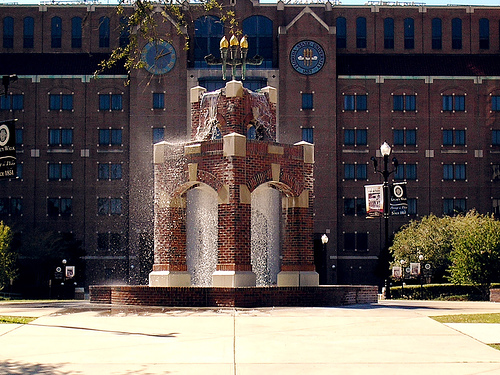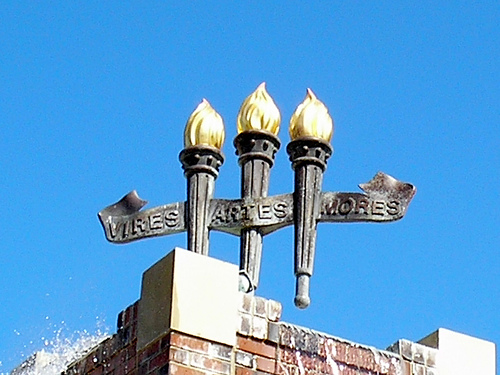|
|
|
Heritage Tower: The Torch
by William Nelson
While the Heritage
Tower fountain or "the Torch" is a relatively new feature on FSU’s
campus, its roots are deep in the history of Florida State
University.

|
The
fountain was constructed near the University Center in 1998, while
the university center itself was being constructed. It was named the
Heritage
Tower due to the people who gave it and what is supposed to represent.
The word
heritage can be defined as a way of life or traditional culture that is
passed
from one generation to the next, and by this definition torch
represents the
traditions and culture that has been shared by the students of FSU and
FSCW
over the years. This gift not only continued in the class gift
tradition that
was established at FSCW, but also reflected on the strong ties between
the
University and its alumnae. |
The Torch was a presented to FSU from the
graduating classes of 1946, 1947, and 1948. These
classes represent a transitional time
when FSCW changed into
FSU. The class of 1946 is considered the
last true class of FSCW. While the class of 1947 started to see the
change from
an all women's school to a coed one and also was the first class to
reach over 1,000.
The graduate’s diplomas of this year were the only ones to read both
FSCW and
FSU on it. Since the introduction of the
GI bill men had been slowly let into FSCW since the end of WW2 in 1945,
but it
was not until 1947 that they were integrated into the school itself as
full
students. Finally the class of 1948 is considered the first real
class of
FSU and the dedication of the fountain in 1998 marked the fiftieth year
of the
school. The credit of the idea of this monument goes to four very
important people, who without their efforts the fountain would never
have been
possible. First, there was Sarah Lewis Marxson who was the class
president and graduated
in 1947. Then there was Mary Lou Norwood who graduated in 1947 and was
the Gift
Chair; she also was one of the main people involved in the publication
of
Femina Perfecta (a history of FSCW). Following them was Shirly Rodgers
Tellander
and Frances Cannon who gradated in 1947 and 1948 respectively. While
these
wonderful people rigorously engaged in fund raising, this included not
just
people from the classes of 46’- 48’, but all the previous classes of
FSCW. When it was said and done over 1,200
individuals contributed to the fountain. Larry
Rubin, project manager for the
University center, and Mark
Bertolami, FSU facilities planning, were the people behind the scenes
getting
the project approved. Also David Fronzak of Barnett and Fronczak
Aritects
donated his firm for the design and planning of the fountain.
Fronczack
appointed Brant Chaissan to work with a committee of about fifteen
people who
graduated between 46` and 48` to come up with a design, however,
Fronczak took
over the project during the construction.
| The
design of the fountain
echoes the collegiate gothic style of the older buildings on campus and
each
facet of the fountain represented something from the University and
this
transitional period. The top of the fountain is dawned with the classic
three
torches (a symbol adopted in 1909) sitting on top of both the seals for
FSU and
FSCW. The arches are meant to represent the entering and exiting
of
students from FSU and the flowing waters are supposed to represent the
passage
of time, which flows into a pool at the base which is supped to
represent FSU
and the campus. Also buried in the fountain itself are materials that
document
the history of FSU and FSCW. The Latin inscription on the torch "Vires,
Artes, Mores" is the physical, mental and moral ideal and purpose of
higher education. |

|
Sources:
Laurie, Murray D. Guide to FSU and
Tallahassee. Pineapple Press inc. Sarasota, 1999.
Heritage Tower:
“The Torches”, A
Commemorative Publication. April 18, 1998.
|
|
Photographs by William Nelson
|

